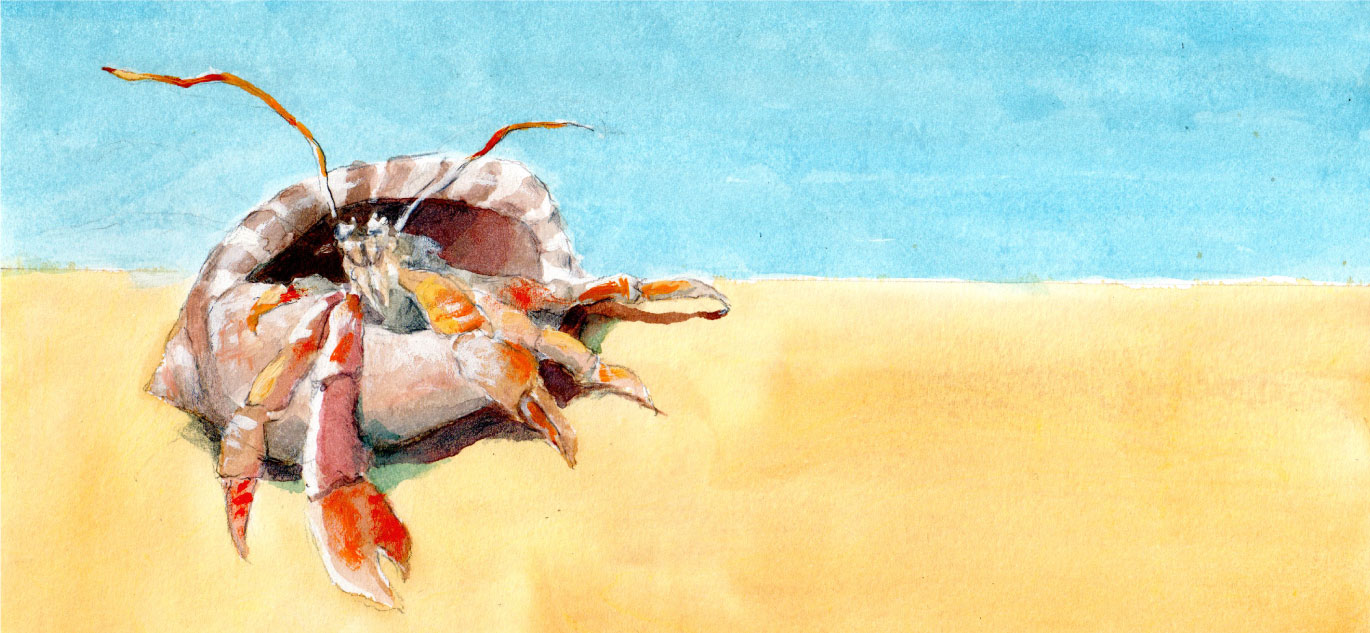I was born in the year J.M. Coetzee published his third novel, Waiting for the Barbarians. My mother read this dark, disturbing novel with its multiple scenes of torture as she breastfed me at night, while my older sister was asleep and the house was quiet. It was 1980. The apartheid government had declared a State of Emergency in the face of growing internal revolt, and my parents were thinking of leaving South Africa again...
It was during this period that her work on Coetzee took off, as she tested her earlier intuitions about his novels against the theory she'd been reading. She took note of the character Magda's description from
In the Heart of the Country of herself as a hermit crab, skulking in one empty shell after another, a parasite feeding on the cooling entrails of its host, 'wondering whose tissues it will live off next.' The scuttling hermit crab, the cannibalism of parasite and host: could these, she wondered, be metaphors for the way Coetzee adopted, adapted, inhabited other discourses, both theoretical and novelistic?
Description
For Ceridwen Dovey, J.M. Coetzee 'has always been there, an unseen but strongly felt presence in our small family drama.' As a child, she observed with fascination her mother's immersion in Coetzee's writing as she worked on what would become the first critical study of his early novels. Even now, as a writer herself, Ceridwen's relationship with Coetzee's books is still mediated by her mother's readings of them: to get to him, she must first step through her mother's formidable mind. With tenderness and insight, Ceridwen draws on this personal history to explore the Nobel Prize-winner's work - how his books 'do theory' on themselves - while also tracing the intellectual heritage that has been passed from mother to daughter.
About the Writers on Writers series
Some of Australia’s most acclaimed writers feature in this groundbreaking collaboration between independent publisher Black Inc., the University of Melbourne and the State Library of Victoria. In a series of six short books, each author reflects on another Australian writer who has inspired and influenced them.
You can purchase the hardback or e-book of On J.M. Coetzee: Writers on Writers here, and read an excerpt on The Paris Review Daily here. Or you can download the audiobook here.
Reviews
-
“On J.M. Coetzee is a bright gem...A kind of palimpsest, South African-born Ceridwen Dovey’s reading of Coetzee overlays witnessing her mother’s study of his work. It traces abandonment and desire through the relationship between readers and writers. Curiously, beautifully, despite and through its surface subject, it comes like Woolf’s essay to limn ideas of women and fiction – or mothers, reading, and writing – in revealing ways...In this ambivalent, fructive space, Dovey’s reading and writing develop, along with this work, which enfolds an exquisite Künstlerroman, and a celebration as much of Teresa Dovey as of J.M. Coetzee.”
-
“Of all the titles in Black Inc’s Writers on Writers series, Ceridwen Dovey’s essay on J.M. Coetzee arrives with the most intellectual excitement, as well as the greatest anticipatory unease. This is because Coetzee – two-time winner of the Booker Prize, recipient of the Nobel, the most august literary figure to hold an Australian passport since the death of Patrick White – is also notoriously cool, aloof and reticent about the meaning and nature of his work. How to connect with such a man?
Dovey...places the senior writer’s austere aesthetic front and centre in her book. Cleverly, she then uses the great gulf that exists between her and him to generate a real frisson...All of this Dovey reads through the prism of her mother, Teresa, a scholar who wrote one of the first academic monographs on Coetzee’s work and a woman whose identification with Coetzee and his work was so strong that it gave shape to Teresa’s emerging identity. Both mother and daughter have much to thank Coetzee for. Should he read this lucid and reverent essay, John Coetzee will have grounds to feel gratitude, too. ”

